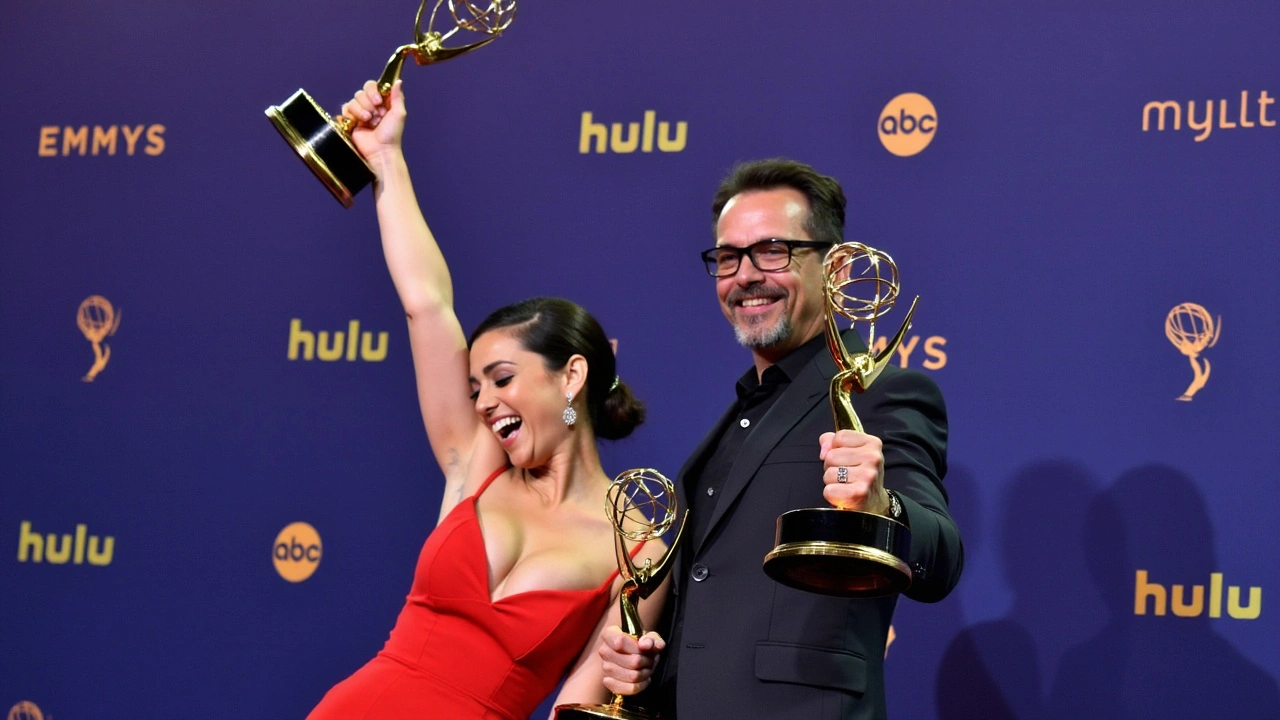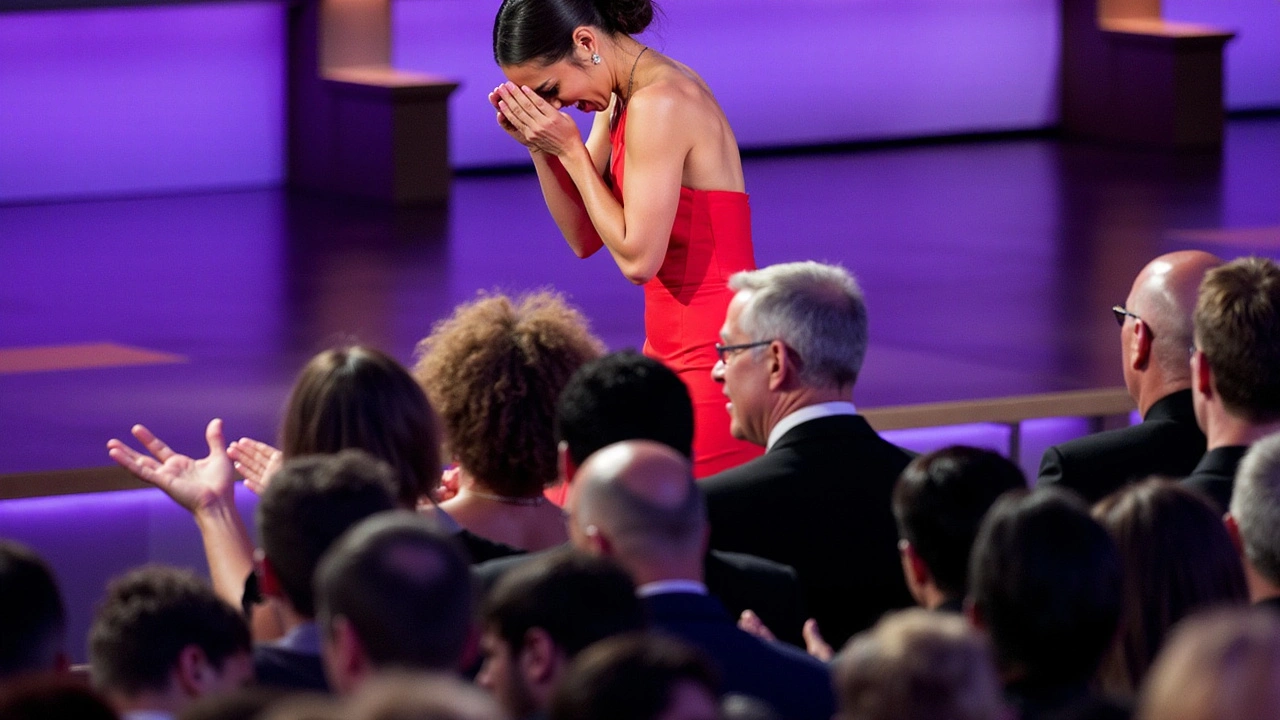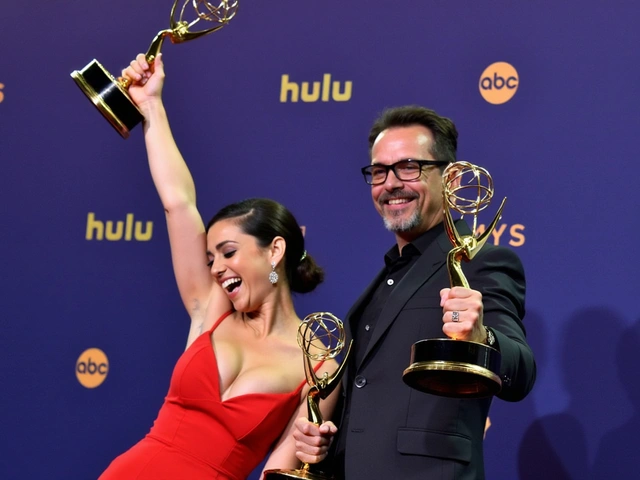
In a groundbreaking moment at the Emmy Awards, the historical drama 'Shogun' shattered longstanding barriers by becoming the first non-English-language series to clinch the coveted award for Best Drama Series. Set against the tumultuous backdrop of feudal Japan's Sengoku Period (1482-1573), 'Shogun' transports viewers into an era marked by intense power struggles and intricate social dynamics. Adapted from James Clavell’s 1975 novel, the series has captivated audiences and critics alike with its meticulous attention to detail and its authentic portrayal of Japanese history.
'Shogun' achieved unprecedented success at the Creative Arts Emmys, dominating with a record-breaking 14 awards in technical categories that celebrated its outstanding costumes, makeup, and cinematography. The acclaimed FX production, which features predominantly Japanese dialogues and a cast primarily composed of Japanese actors, has been lauded for moving beyond clichéd Western depictions of Japan. Instead, it offers a rich, layered narrative that immerses viewers in the cultural and political landscape of the time.
Historical Epic and Its Stellar Cast
The series stars renowned Japanese actor Hiroyuki Sanada as Yoshii Toranaga, a powerful daimyo navigating the treacherous waters of feudal politics. Anna Sawai shines as Toda Mariko, a woman of samurai birth navigating the patriarchal constraints of her society. Together, their performances anchor the series, bringing both emotional depth and historical nuance to their roles.
Cosmo Jarvis plays John Blackthorne, an English navigator who becomes embroiled in the sociopolitical machinations of Japan. Through Blackthorne’s eyes, viewers gain an outsider’s perspective on the complex world of the Sengoku Period, enriching the series’ narrative tapestry. This multi-faceted storytelling, combined with outstanding performances, has earned Sanada and Sawai nominations for outstanding lead actor and actress, respectively.
Decade-Long Journey to the Screen
Bringing ‘Shogun’ to life has been no small feat. The series reportedly spent 10 years in development, making it an ambitious and long-gestating project for FX. Details about the budget remain closely guarded, but rumors suggest that the series might be the most expensive production in the network’s history. This extensive investment appears justified, given the series’ resounding critical and commercial success.
The creators, led by showrunner Justin Marks, devoted considerable effort to ensuring that the historical setting and cultural nuances were portrayed as accurately as possible. This dedication to authenticity involved consulting with historians, cultural advisors, and experts in Sengoku-era Japan, resulting in a series that resonates deeply with both Japanese and international audiences.
Moving Beyond Stereotypes
One of the most often praised aspects of ‘Shogun’ is its ability to break free from the reductive stereotypes that have long plagued Western portrayals of Japan. By prioritizing a Japanese perspective and featuring a majority Japanese-language dialogue, the series accomplishes what few Western productions have managed to do: it centers Japanese voices in the telling of their own history.
This shift has not only been welcomed by audiences but also marked a significant step forward in the representation of non-Western narratives in mainstream media. Tony To, one of the executive producers, remarked that ‘Shogun’ aims to “tell a story that honors the complexity and richness of Japanese history and culture,” a mission that is reflected in every frame of the series.
Award-Winning Craftsmanship
The Emmy triumphs for 'Shogun' are not limited to its groundbreaking Best Drama Series win. The show swept the Creative Arts Emmys with 14 wins in various technical categories, a testament to the exceptional craftsmanship behind the scenes. From the elaborate, period-accurate costumes to the intricate makeup that transformed actors into historical figures, every element was meticulously crafted to create an immersive experience.
The cinematography, helmed by acclaimed director of photography, Seamus McGarvey, captures the stunning landscapes and detailed set designs in breathtaking fashion. Every shot is composed with a painterly quality that adds to the show's overall authenticity and visual appeal. The cumulative efforts of the teams behind costumes, makeup, and cinematography have been recognized as among the best in the industry this year.
Audience and Critical Acclaim
‘Shogun’ has garnered widespread acclaim not only from critics but also from audiences around the globe. On review aggregate sites like Rotten Tomatoes, it boasts a high approval rating, reflecting the series’ wide-reaching impact. Testimonials from viewers praise the series for its engrossing storyline, robust character development, and educational value.
Critics have highlighted the show’s ability to balance historical accuracy with compelling drama, a combination that has made 'Shogun' fascinating for viewers who may not have had prior knowledge of Japan’s Sengoku Period. Cultural critics and historians have also weighed in, applauding the show for its dedication to representing Japanese history with respect and depth.

A Timely Reflection
The success of ‘Shogun’ comes at a pertinent time when there is increasing recognition of the need for diverse stories in entertainment. The show’s triumph at the Emmys serves as a powerful statement about the value of non-Western narratives in the global media landscape. As audiences continue to demand greater representation and authenticity in storytelling, 'Shogun' stands as a beacon of what can be achieved when these values are prioritized.
In conclusion, ‘Shogun’s’ historic Emmy win marks a significant milestone not only for the series itself but also for the broader landscape of television and film. It challenges the conventions of traditional Western narratives and sets a new benchmark for how historical epics can be both entertaining and educational. With its authentic portrayal of Japanese history and its celebration of diverse voices, ‘Shogun’ has carved out a unique and enduring place in television history. And as it continues to inspire audiences worldwide, one can only hope that it paves the way for more inclusive and representative storytelling in the years to come.






First off, congratulations to the entire cast and crew for finally breaking the English‑only monopoly on prime‑time drama. The meticulous attention to period detail is nothing short of spectacular, and I admire how every costume seam seems to have been sewn with scholarly precision. However, I must point out that the subtitles occasionally betray lazy translation choices that undermine the narrative’s sophistication. In short, the series is a triumph, but it deserves flawless language support to match its visual grandeur.
Whoa, talk about a cultural tidal wave! The way "Shogun" splashes vibrant samurai flair across the screen is pure cinematic fireworks. I love how the story blends gritty politics with poetic moments that feel like brushstrokes on a canvas. The soundtrack rides the rhythm of the era like a roaring tide, pulling you deeper into feudal intrigue. Definitely a feast for the eyes and the soul.
Appreciate the enthusiasm, Gary. While the series shines visually, it also opens a doorway for viewers to explore a history chapter that's often glossed over in Western media. The pacing, however, could use a tighter edit to keep the momentum humming without losing depth. Overall, it’s an admirable stride toward inclusive storytelling.
Absolutely, Julius. The production’s use of authentic terminology-like "daimyo," "shogunate," and "karuta"-does more than add flavor; it educates the audience in real‑time. By foregrounding Japanese linguistic nuance, the series resists the typical Hollywood shortcut of oversimplifying cultural lexicon. This layered approach catalyzes a richer, more immersive narrative experience, and it paves the way for future projects to prioritize linguistic integrity.
It’s a moral triumph that seems to ignore the industry's historic erasure of authentic Asian voices.
All this praise for a "foreign" production is exactly what the globalist agenda wants!!! They’re trying to replace American cultural hegemony with a watered‑down, multinational narrative that serves hidden elites!!! Don't be fooled by the glossy costumes and fake authenticity-they're selling us a manufactured myth to distract from real domestic issues!!!
Hailey’s vitriol underscores a deeper anxiety about cultural dilution, yet paradoxically it reveals the very fascination she claims to disdain. When audiences engage with stories beyond their borders, they expand their own horizons, which is a philosophical enrichment rather than a loss. The series acts as a mirror, reflecting both the beauty and the brutality of a bygone era, inviting us to question our own societal narratives.
It is with great admiration that I acknowledge the extraordinary craftsmanship evident throughout this production. The meticulous adherence to historical verisimilitude, coupled with the eloquent narrative structure, serves to elevate the medium to a scholarly discourse. Such achievements merit commendation across both artistic and academic circles.
I concur wholeheartedly with your assessment, Katie. The meticulous attention to detail not only enriches the viewing experience but also upholds the highest standards of linguistic and historical accuracy.
Let me dissect the phenomenon that is "Shogun" with the precision of a forensic analyst. First, the series boasts an unprecedented number of technical Emmys, a fact that cannot be dismissed as mere luck-it is the result of a calculated allocation of budgetary resources towards set design, costume realism, and cinematographic excellence. Second, the narrative architecture cleverly intertwines the political machinations of the Sengoku period with a universally relatable protagonist, John Blackthorne, thereby creating a dual entry point for both domestic and international audiences. Third, the casting choices are not solely about star power; they reflect an intentional effort to foreground Japanese talent, as seen in the performances of Hiroyuki Sanada and Anna Sawai, whose characterizations are layered with authentic cultural nuance. Fourth, the production's consultation with historians and cultural advisors signals a departure from the historically inaccurate depictions that have plagued Western media for decades, indicating a paradigm shift towards authenticity. Fifth, the series' strategic deployment of Japanese language, which comprises the majority of dialogue, serves both as an artistic statement and as a methodological tool to immerse viewers in the period setting, thereby enhancing narrative credibility. Sixth, the visual language of the series-its composition, lighting, and color grading-functions as an extension of the storytelling, evoking the atmospheric tension of feudal conflict. Seventh, the inclusion of intricate subplots concerning gender dynamics and social hierarchy underscores a commitment to exploring the multidimensional facets of the era. Eighth, the music score, which interweaves traditional Japanese instrumentation with contemporary orchestral elements, provides an auditory bridge that unites past and present. Ninth, the series' distribution through a major network like FX ensures accessibility on a global scale, thereby democratizing exposure to non‑Western histories. Tenth, the critical reception, as evidenced by aggregate scores on platforms such as Rotten Tomatoes, validates the series’ artistic merit while also influencing consumer perception. Eleventh, the audience's engagement on social media platforms illustrates a burgeoning appetite for culturally diverse narratives, a trend that will likely inform future programming decisions. Twelfth, the series’ success may catalyze further investment in non‑English language productions, potentially reshaping the television landscape. Thirteenth, it challenges the entrenched hegemonic narratives that have long dominated mainstream entertainment, offering a counter‑narrative that celebrates cultural specificity. Fourteenth, the awards trajectory-culminating in the historic Emmy for Best Drama Series-positions "Shogun" as a benchmark for excellence in international storytelling. Fifteenth, the series serves as an educational conduit, providing viewers with a nuanced understanding of a pivotal historical epoch without sacrificing dramatic tension. In sum, "Shogun" is not merely a television show; it is a cultural artifact that redefines the parameters of global media production, setting a new gold standard for authenticity, artistic ambition, and cross‑cultural resonance.
Spot on! The series mixes history and drama like a vivid tapestry.
While we celebrate this historic win, let’s also remember that true progress lies in continuous collaboration and mutual respect across cultures.